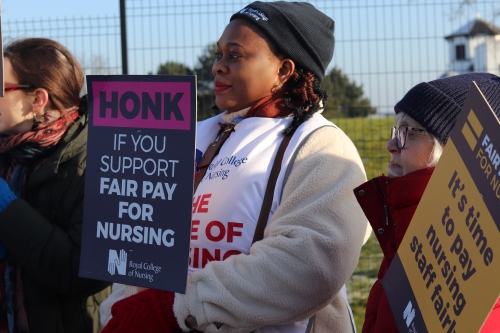Government to repeal controversial ‘anti-strike’ law

The new Labour government has confirmed it will repeal the so-called anti-strike bill, in a move to “reset” industrial relations across Great Britain.
The government argued that the Strikes (Minimum Service Levels) Act had not resolved any strikes so far and had only “inflamed tensions” with workers and unions.
“Scrapping minimum service levels marks another significant step in resetting relationships with staff”
Wes Streeting
The law was introduced in 2023 by the previous Conservative government, despite many months of pushback in parliament and widespread condemnation from employers and trade unions.
The law gave ministers the power to impose minimum service levels when industrial action is taking place across key sectors, including health, education and transport.
As part of this, employers can provide ‘work notices’ to employees who have voted to strike, meaning that they can be forced to work to maintain the minimum service levels.
Under the law, nursing staff face the threat of dismissal if they do not comply with their work notice on strike days.
Unions must also take reasonable steps to ensure that all workers comply with their work notice, or else they will face consequences too.
Today, the government confirmed that it would repeal the legislation through the new Employment Rights Bill, which will be introduced within the first 100 days of its tenure.
It argued that minimum services levels restrict the right to strike and undermine good industrial relations.
The deputy prime minister, Angela Rayner, and business secretary, Jonathan Reynolds, have today written to government departments with sectors most impacted by strikes, including health, as well as the Welsh and Scottish governments, to state that the government intends to repeal the legislation.
They have also written to all 12 metro mayors – also known as directly-elected mayors – across the country to start engaging with local employers on the upcoming change.
In the meantime, the government has urged employers to “seek alternative mechanisms for dispute resolution” instead of using minimum service levels, such as negotiation and discussions with trade unions.
Ms Rayner said: “Attempting to clamp down on the fundamental freedom of working people has got us nowhere and this was targeted at sectors who dedicate their lives to serving us all.
“That’s why we’re scrapping this pointless law and creating a new partnership between business, trade unions and working people through our new deal.
“Repealing this legislation is the first part of our plan to reset industrial relations so they are fit for a modern economy.”
“This legislation should have never reached the statute book”
Christina McAnea
Meanwhile, the health and social care secretary, Wes Streeting, noted that the law “failed to resolve devastating strikes” which led to cancelled operations and cost the NHS billions of pounds.
“Scrapping minimum service levels marks another significant step in resetting relationships with staff, as we fix the broken health service,” he added.
Responding to the announcement, the Royal College of Nursing general secretary and chief executive, Professor Nicola Ranger, said: “Nursing staff are a safety-critical workforce in health and care services, and when you prevent them from speaking out you put patients at risk.
“The government is absolutely right to heed our calls to repeal an Act that was harmful to industrial relations and did nothing to advance the cause of high-quality and safe patient care.
“The government must soon go the whole way and remove the remaining anti-union legislation and continue on this mature approach to relations with public sector workers and their representatives.”
Meanwhile, Unison general secretary, Christina McAnea, praised the government for scrapping the law.
“This legislation should have never reached the statute book,” she explained.
“No one wanted minimum service levels, only a spiteful government watching power drain away and desperate to shore up its rapidly disappearing support.”
Ms McAnea noted that essential cover was “always provided in health disputes”.
“Now this pernicious law has been kicked to the kerb, health workers and their unions can focus on working with government and employers to get the NHS back on its feet,” she added.
Also responding, the deputy chief executive of NHS Providers, Saffron Cordery, said trust leaders would “welcome this move”.
She added: “Months of strikes have been hugely disruptive and costly for patients, staff and the health service but the laws didn’t address any of the issues behind the walkouts – including dissatisfaction with pay, working conditions and ever-increasing demand.
“The legislation risked making industrial relations between trust leaders and frontline teams worse.
“When industrial relations become strained we need government and unions to get around the table and talk at the earliest opportunity to avert disruption to patient care.”







